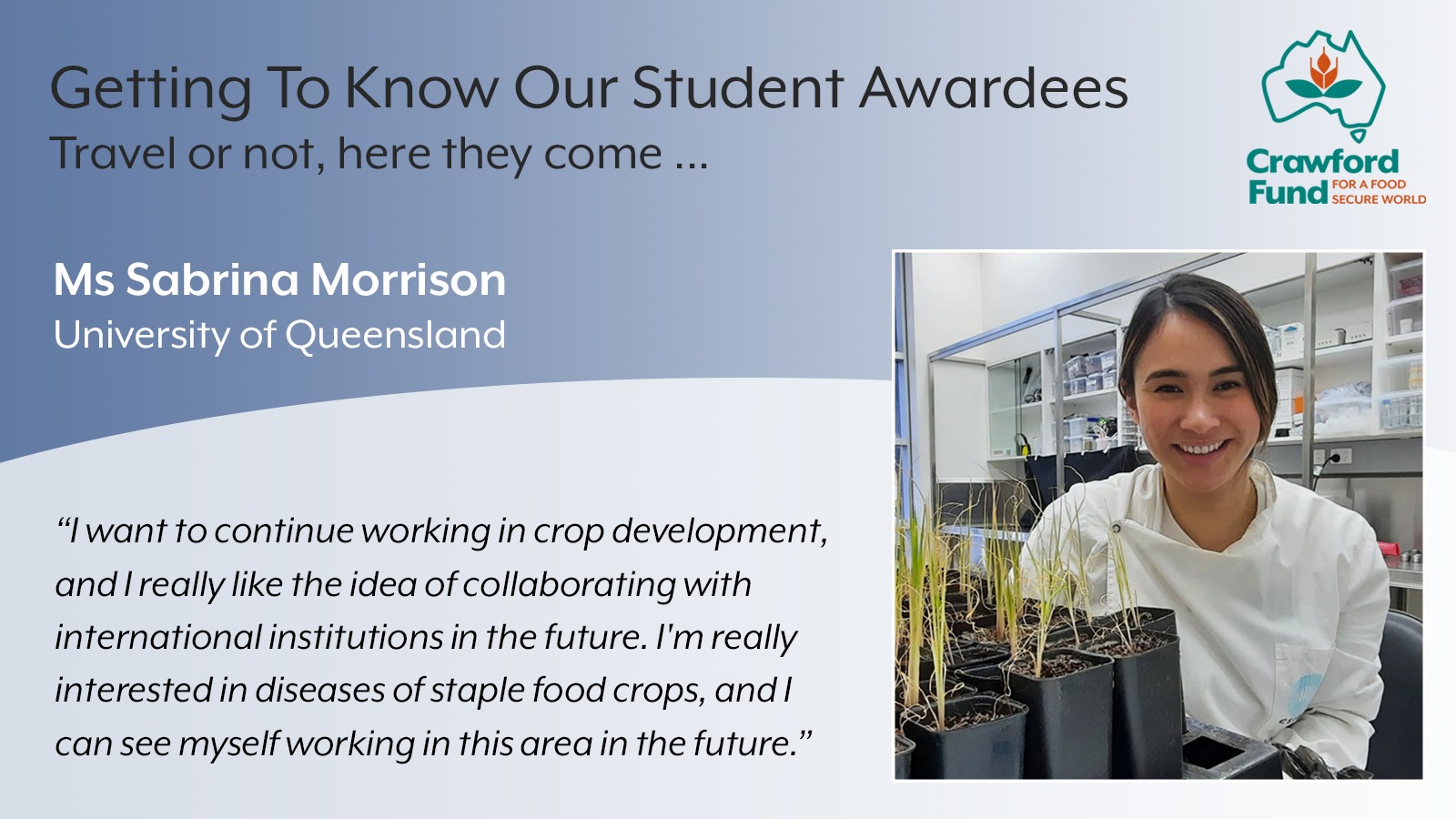

Getting to know our Student Awardees – Sabrina Morrison, University of Queensland
October 19, 2021

In July, we announced our 2021 Student Awardees – those talented students from around Australia selected by our State and Territory Committees to experience international agricultural research and development first-hand, in a COVID safe manner of course!
The 2021 recipients will carry out research across a diverse range of topics, focused in Australia, Laos, Fiji, Samoa, Uruguay, Malaysia, Vietnam, Brazil, Nepal and Myanmar. We would like to thank our partner organisations for making these opportunities available, including the Australian Centre for International Agricultural Research, Grains Research and Development Corporation, International Maize and Wheat Improvement Center (CIMMYT), and the Sunrice Rice Research Facility.
We are really pleased to now bring you more details of each of our Awardees, their projects, and what they hope to achieve with the opportunity provided by our support. We are pleased to also provide input from our awardees’ supervisors on what they see as the benefit of the opportunity to add an international component to their student’s studies and research.
Presenting:
Sabrina Morrison
Bachelor of Science (Honours)
University of Queensland
Research – Rapid discovery and utilisation of novel disease resistance in barley
Supervisor quote
This Award will support Sabrina’s research experience in Uruguay where she will evaluate diverse barley landraces in the search for new sources of genetic resistance to net blotch disease. It provides a unique opportunity to put her skills in plant pathology into action and contribute to the development of disease resistant crop varieties for farmers in Australia and South America.
A/Prof Lee Hickey, Principal Research Fellow, Centre for Crop Science, Queensland Alliance for Agriculture and Food Innovation, The University of Queensland
How did you become interested in international ag for development and focusing your research in developing countries?
I took part in a lot fundraisers and events for global food security in high school, so I’ve always had an interest in international agricultural systems. But it wasn’t until I attended a Crawford Fund Q&A panel during a summer studentship and met researchers who were travelling and making contributions to these communities that I realised I could also play an active role in international agriculture.
I like the idea of being involved in research that will benefit agriculture in both Australia and developing communities.
Are there benefits to Australia from the proposed award work?
This project looks at diseases in barley. One of the biggest benefits to Australia will be furthering our understanding on how exotic pathogens interact with Australian cultivars. Specifically, we’ll get a better idea about whether and to what extent our barley lines are resistant to overseas diseases, and this will be useful for barley breeding in the future.
Please tell us about what you hope to do as part of your award and the impact it may achieve.
I hope to go to Uruguay and assess a set of barley lines against Uruguayan strains of a fungal disease known as net form of net blotch (NFNB). This pathogen causes yields losses in barley all over the world, including in Australia. It’s becoming an increasing problem for Australian farmers because the pathogen is starting to develop resistance against conventional fungicides. My project will focus on identifying novel resistance genes in barley lines against exotic strains of NFNB. Specifically, I’ll be collaborating with the National Agricultural Research Institute of Uruguay to inoculate these different barley lines with the fungus and assess for subsequent disease. We’ll then compare resistance traits across Australian and Uruguayan pathotypes of NFNB and identify novel genes that facilitate stable resistance across both countries. By doing this we’ll provide Queensland breeders with a better understanding of the genomic regions of value for resistance breeding.
Do you have a strategy to carry out the award research, even if travel is not possible, that you’d like to share with other awardees?
Thanks to Zoom, a lot of collaboration is still possible even without me travelling to Uruguay. Some of the work is also computer-based, which I could do in Australia.
What do you want to be working on in the future?
I want to continue working in crop development, and I really like the idea of collaborating with international institutions in the future. I’m really interested in diseases of staple food crops, and I can see myself working in this area in the future.
Do you have advice for others interested in getting involved in international ag development?
I always suggest people get involved with societies and institutions that are relevant to their interests. I think this is such a great way to connect with academics in your field.
I’ve met some great people through my involvement with networks like Researchers in Agriculture for International Development (RAID) and through my university societies, and these relationships have helped me find opportunities like the Crawford Fund student award.




